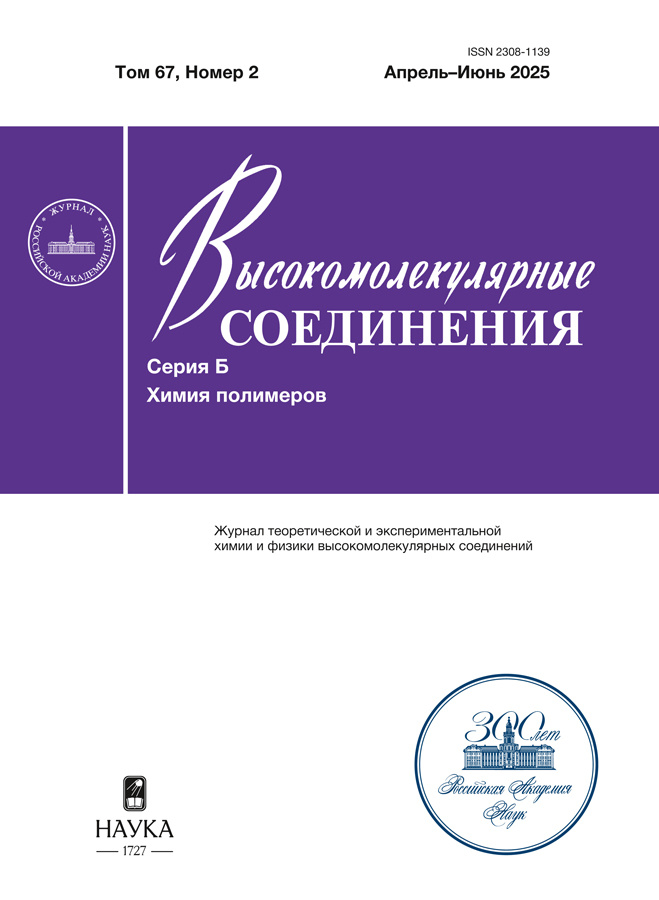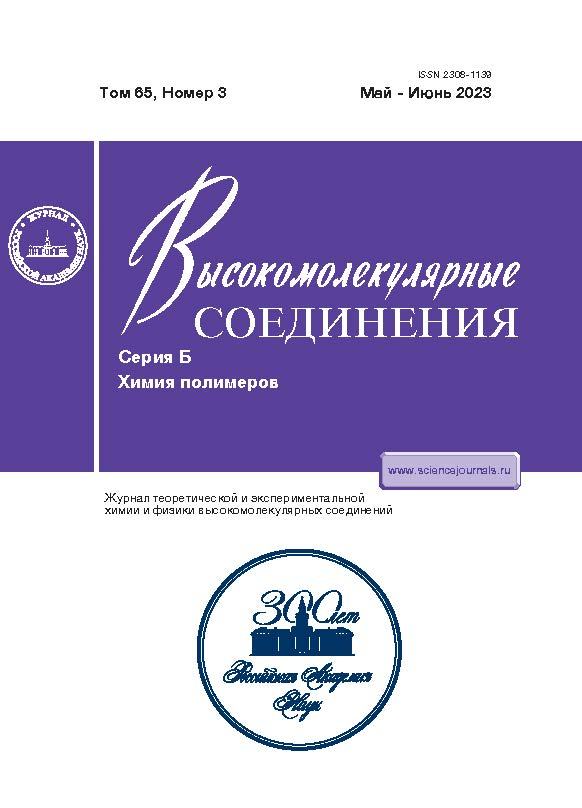Том 65, № 3 (2023)
ОБЗОРЫ
ДВУХФОТОННАЯ СТЕРЕОЛИТОГРАФИЯ – ОПТИЧЕСКАЯ НАНОЛИТОГРАФИЯ
Аннотация
Свободнорадикальная фотополимеризация широко используется в аддитивных технологиях и, в частности, в стереолитографии с одно- и двухфотонным инициированием полимеризации. Однофотонная стереолитография позволяет создавать объекты с разрешением ~100 мкм. Двухфотонная стереолитография, инициируемая фемтосекундным лазером ближней инфракрасной области спектра, позволяет изготавливать произвольные 3D-микроструктуры cо сверхвысоким разрешением на микро- и наномасштабном уровне (~100 нм). В обзоре рассмотрены каждый из указанных методов и механизмы одно- и двухфотонного возбуждения. Систематизированы результаты исследований последних лет, касающиеся компонентов фотополимеризующихся композиций, а также подходов к уменьшению размера элементов объектов и увеличению скорости их формирования.
 163-188
163-188


ПОЛИМЕРИЗАЦИЯ
ОСОБЕННОСТИ ПОЛИМЕРИЗАЦИИ МЕТИЛМЕТАКРИЛАТА С УЧАСТИЕМ МЕТИЛЕНОВОГО СИНЕГО И ЭТИЛ-2-БРОМИЗОБУТИРАТА В УСЛОВИЯХ ФОТООБЛУЧЕНИЯ
Аннотация
На примере полимеризации метилметакрилата изучены особенности синтеза полимеров в присутствии каталитической системы [метиленовый синий + этил-2-бромизобутират] при комнатной температуре и облучении видимым светом. Оценено влияние условий проведения полимеризации, в том числе длины волны светового облучения и активаторов различного строения на конверсию мономера и молекулярно-массовые характеристики полимеров. Показано, что процесс полимеризации может протекать в контролируемом режиме в мягких температурных условиях по механизму с переносом атома (Metal Free Atom Transfer Radical Polymerization) до высокой конверсии, причем при низких значениях концентрации фотокатализатора.
 189-203
189-203


ОБ ОТСУТСТВИИ ЦИКЛИЧЕСКИХ СТРУКТУР В РАЗВЕТВЛЕННЫХ ПОЛИСТИРОЛАХ, СИНТЕЗИРОВАННЫХ “ЖИВОЙ” ТРЕХМЕРНОЙ РАДИКАЛЬНОЙ ПОЛИМЕРИЗАЦИЕЙ В СРЕДЕ С УХУДШАЮЩИМСЯ ТЕРМОДИНАМИЧЕСКИМ КАЧЕСТВОМ РАСТВОРИТЕЛЯ
Аннотация
Методом радикальной сополимеризации стирола и дивинилбензола с обратимым ингибированием (в присутствии 2,2,6,6-тетраметилпиперидин-1-оксила) в условиях ухудшающегося термодинамического качества растворителя синтезированы разветвленные полистиролы. Полученные полимеры исследованы методами эксклюзионной хроматографии в сочетании со статическим светорассеянием, озонолиза, ЯМР, дифференциальной сканирующей калориметрии. Разветвленные полимеры, полученные методом “живой” радикальной полимеризации, характеризуются пониженными величинами характеристической вязкости по сравнению с линейными аналогами. Константа уравнения Марка–Куна–Хаувинка для этих полимеров в растворе тетрагидрофурана (а = 0.29) подтверждает нелинейную архитектуру макромолекул и в совокупности с высоким содержанием “подвешенных” двойных связей, сравнимым по порядку величины с их теоретическим содержанием в отсутствие реакции циклизации, свидетельствуют об их разветвленном строении. Температуры стеклования разветвленных полистиролов на 20–35 градусов ниже температуры стеклования линейного полистирола.
 204-216
204-216


МЕДИЦИНСКИЕ ПОЛИМЕРЫ
ИЗУЧЕНИЕ АНТИМИКРОБНОГО ДЕЙСТВИЯ ХИТОЗАНОВОГО ПОКРЫТИЯ, ДОПИРОВАННОГО ФТОРСОДЕРЖАЩИМИ ХИНОЛИНАМИ
Аннотация
На основе хитозана и вновь синтезированного соединения фторхинолинового ряда ‒ 5-диметиламинометил-7-(2,2,2-трифтор-1-гидрокси-1-трифторметил-этил)хинолин-8-ола получен новый композит. Проведен сравнительный анализ его антимикробной активности с другими хитозановыми композитами, содержащими в своем составе применяемые в современной медицине такие антибиотики, как тетрациклин, ванкомицин и ципрофлоксацин. Продемонстрирована высокая эффективность 5-диметиламинометил-7-(2,2,2-трифтор-1-гидрокси-1-трифторметил-этил)хинолин-8-ола при подавлении роста Staphylococcus Aureus. Установлена возможность получения хитозановых наночастиц, допированных новым композитом, для применения их в качестве “интеллектуального” покрытия биопротезов клапанов сердца, в том числе с использованием угольной кислоты. Найден подход, позволяющий формировать гибридный биоматрикс на основе стабилизированного глутаровым альдегидом ксеногенного перикарда с ковалентно привязанным к нему полимерным “экраном” из хитозановых наночастиц как нано(микро)контейнеров с антимикробными агентами. Методом ионного гелирования синтезированы стабильные наночастицы хитозана, допированные новым композитом, что подтверждается высоким значением дзета-потенциала (|ζ| ~ 45 мВ). С помощью микроскопии высокого разрешения идентифицировано ультратонкое покрытие из полимерных сферических наночастиц (~70 нм), имеющих высокую адгезию к коллагеновым фибриллам. Показана возможность реализации индуцированного изменением рН среды “умного” антимикробного ответа данного биопокрытия за счет вариантов конформации (раскручивания) полимерных наночастиц хитозана и высвобождения цидных агентов в случае роста патогена на его поверхности.
 217-229
217-229


КОМПОЗИТЫ
ПОЛИАМФОЛИТ-МЕТАЛЛИЧЕСКИЕ КОМПЛЕКСЫ ДЛЯ КАТАЛИТИЧЕСКИХ ПРОЦЕССОВ
Аннотация
Получены полиамфолит-металлические комплексы на основе полиакриловой кислоты и алифатичесих диаминов – этилендиамина, 1,3-диаминопропана, 1,4-диаминобутана и Cu2+ путем взаимодействия водных растворов полиамфолитов и CuSO4. Методом синхронного термического анализа определено, что процесс термодеструкции комплексов происходит трехступенчато. Энергия активации термодеструкции полиамфолит-металлических комплексов 22‒99 кДж/моль. Методом рентгенофазового анализа установлено, что продукты термодеструкции полиамфолит-металлических комплексов являются гетерогенными системами, слагающимися из фаз CuO и Cu2O, а катализаторы на их основе – гетерогенные системы, состоящие из фаз Al2O3 и CuO. Распределение пор катализатора по их размерам показало, что объем пор с диаметром менее 773 нм составляет 0.80–0.83 см3/г, удельная поверхность 349–351 м2/г, а преобладающий эквивалентный диаметр пор 6.2–6.3 нм. Механическая прочность на раздавливание гранул катализатора составила 7.1–7.3 МПа. В процессе окисления CO в CO2 катализатор начинает проявлять свою активность при 180–187°С, полная конверсия CO в реакции окисления достигается при 280–286°С. Производительность полученных катализаторов в 2.7–2.8 раза выше производительности образца сравнения.
 230-240
230-240













